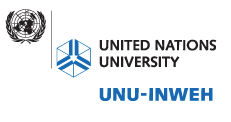A study by the UN University's Institute for Water, Environment and Health (UNU-INWEH) finds a lack of data on wastewater generation, treatment and use around the world.
The study, titled 'Global, regional and country level need for data on wastewater generation, treatment and use,' predicts wastewater use will increase worldwide in response to growing water scarcity and provides recommendations for ensuring safe wastewater management.
 5 September 2013: A study by the UN University’s Institute for Water, Environment and Health (UNU-INWEH) finds a lack of data on wastewater generation, treatment and use around the world. The study, titled ‘Global, regional and country level need for data on wastewater generation, treatment and use,’ predicts wastewater use will increase worldwide in response to growing water scarcity and provides recommendations for ensuring safe wastewater management.
5 September 2013: A study by the UN University’s Institute for Water, Environment and Health (UNU-INWEH) finds a lack of data on wastewater generation, treatment and use around the world. The study, titled ‘Global, regional and country level need for data on wastewater generation, treatment and use,’ predicts wastewater use will increase worldwide in response to growing water scarcity and provides recommendations for ensuring safe wastewater management.
According to Manzoor Qadir, UNU-INWEH, the report highlights “the need to invest the time and resources to fill the global data gap.” The study indicates that nearly one-third of countries lack data on wastewater generation, treatment and reuse. Out of 181 countries studied, 60 have data on one or two aspects, and 57 do not collect data on any aspects.
Among countries that collect wastewater data, 63% of the data is over five years old. Qadir said better data will enable researchers and policymakers to better understand and craft solutions to wastewater management.
Wastewater is a “vast resource if we reclaim it properly, which includes the separation of municipal from industrial wastewater,” according to Zafar Aadeel, UNU-INWEH Director. However, the study shows the percentage of wastewater treatment decreases by average country income. Only 8% of low-income countries treat their wastewater compared to 70% of high-income countries, 38% of upper-middle-income countries and 28% of lower-middle income countries.
The study predicts increased wastewater demand for irrigation, particularly as competition for freshwater increases and rural-urban migration persists. It cautions that developing countries lack adequate treatment facilities and institutions to ensure the safe distribution and management of wastewater. The study therefore recommends, inter alia: enhancing professional capacity to develop technical solutions and address agriculture use of wastewater; and identifying ways to protect farmers and consumers from potentially harmful chemicals and pathogens in wastewater.
UNU-INWEH collaborated with Tottori University, the International Center for Agricultural Research in the Dry Areas (ICARDA), the International Water Management Institute (IWMI) and Hazara University, Pakistan, on the study. The journal Agricultural Water Management published the study. [UNU-INWEH Press Release] [Publication: Global, Regional and Country Level Need for Data on Wastewater Generation, Treatment and Use]